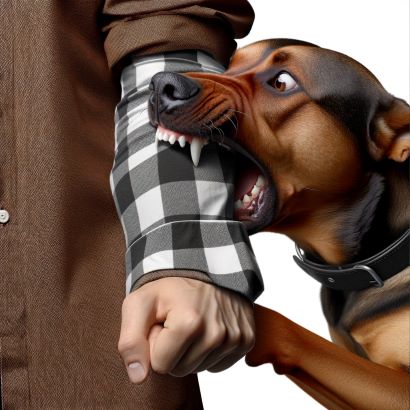Do I need to worry after a dog bite?

When it comes to understanding the implications of a dog bite, many individuals often find themselves asking, “Do I need to worry after a dog bite?” This concern is not only valid but also extremely important for ensuring proper care and prevention of potential health issues that may arise from such incidents. In this comprehensive guide, we delve into various aspects related to dog bites, including immediate actions, medical considerations, legal implications, and long-term precautions, to address the concerns encapsulated by the question, “Do I need to worry after a dog bite?”
Immediate Response to a Dog Bite
The immediate treatment of a dog bite is a critical step in preventing infections and promoting optimal healing. Initially, it’s essential to clean the wound thoroughly with soap and water to remove any bacteria that may have been transferred from the dog’s mouth. After cleaning, the wound should be gently patted dry and covered with a sterile bandage. Applying an antibiotic ointment can also help prevent infection. If the bite is deep, bleeding heavily, or showing signs of infection, such as increased pain, redness, swelling, or oozing, seeking medical attention is paramount. Healthcare professionals may recommend a tetanus booster if yours is not up to date, and in some cases, prescribe antibiotics to ward off infection. The immediate treatment of a dog bite also involves monitoring the wound for signs of infection in the days following the incident. Early and appropriate care is key to managing dog bites effectively, ensuring a swift and uncomplicated recovery.
Medical Considerations
One of the primary reasons you might wonder if you do need to worry after a dog bite is the risk of infections such as rabies, tetanus, and bacterial infections including Pasteurella, Staphylococcus, and Streptococcus. Rabies, although rare in vaccinated dogs, remains a serious concern, particularly with unknown or unvaccinated animals. Prompt medical evaluation ensures appropriate treatment, including rabies prophylaxis if necessary, tetanus shots, and antibiotics to prevent or treat infections.
Legal Implications
The question of “Do I need to worry after a dog bite?” extends beyond medical concerns to legal implications. Depending on where the bite occurred and local laws, the dog’s owner may be liable for damages and medical expenses resulting from the bite. Reporting the bite to local authorities is an essential step in this process, as it not only helps in the potential legal proceedings but also ensures public safety by tracking and managing aggressive animals.
Psychological Impact
A dog bite can have significant psychological effects on the victim, including fear of dogs, anxiety, and post-traumatic stress disorder (PTSD). Addressing these concerns with professional help is vital for recovery. The psychological impact is another dimension to consider when asking, “Do I need to worry after a dog bite?”
Preventing Dog Bites
Understanding how to prevent dog bites is crucial for avoiding future incidents. Learning to read dogs’ body language, teaching children how to safely interact with dogs, and avoiding high-risk situations can reduce the likelihood of bites. Responsible pet ownership, including socialization, training, and proper care, also plays a critical role in preventing dog bites.

When should I get checked after a dog bite?
Determining when to seek medical attention after a dog bite is crucial for preventing infections and ensuring proper wound care. The immediate aftermath of a dog bite can be stressful and confusing, leading many to wonder, “When should I get checked after a dog bite?” The answer to this question depends on several factors, including the severity of the bite, the known vaccination status of the dog, and the location of the injury.
For minor bites that barely break the skin, cleaning the wound with soap and water, followed by application of an antibiotic ointment and a clean bandage, may be sufficient. However, it’s advisable to get checked by a healthcare professional if the bite is more than a superficial scratch, especially if it’s from an unknown dog or if the dog’s vaccination status is unclear. Deep puncture wounds, bites that cause significant bleeding, or injuries to sensitive areas such as the face, neck, or hands warrant immediate medical evaluation.
In addition to the physical damage, there’s a risk of bacterial infection from the dog’s saliva. Diseases like rabies, though rare, can be fatal if not treated promptly. Therefore, any bite that breaks the skin should prompt a visit to a healthcare provider as soon as possible. This visit can ensure that the wound is properly cleaned, assess the need for antibiotics, tetanus boosters, or rabies vaccination, and provide peace of mind.
Prompt medical evaluation after a dog bite can prevent complications and ensure that any necessary treatments are administered in a timely manner. Remember, when in doubt, it’s always better to err on the side of caution and get checked by a professional.
What is considered a deep dog bite?
Identifying what constitutes a deep dog bite is crucial for effective medical treatment and prevention of complications. A deep dog bite is one that penetrates beyond the superficial layers of skin, potentially affecting muscles, tendons, nerves, and even bones. This type of wound is concerning due to the increased risk of infection, including bacteria from the dog’s mouth entering the bloodstream, and the potential for more severe structural damage.
Understanding what is considered a deep dog bite helps in recognizing the urgency of seeking medical attention. Such bites often result in significant bleeding, visible tears or punctures in the skin, and may even expose underlying tissues. The depth and severity of the bite necessitate professional medical evaluation to assess the extent of the damage, initiate appropriate treatment, and possibly administer vaccinations, such as tetanus, or antibiotics to prevent infection.
Recognizing the characteristics of what is considered a deep dog bite is essential. Immediate steps should be taken to clean the wound with water and mild soap and apply pressure to manage bleeding. However, these first aid measures are not a substitute for professional medical advice. Anyone sustaining a deep dog bite should consult a healthcare provider promptly to ensure comprehensive care and mitigate risks associated with such injuries.
Read Also: Why Do Dogs Like Bolster Beds
How soon after dog bite do I need tetanus?
When it comes to treating a dog bite, one of the immediate concerns that arise is, “How soon after dog bite do I need tetanus?” This question is crucial because tetanus, a bacterial infection caused by Clostridium tetani, can enter the body through cuts or puncture wounds, such as those from a dog bite. Understanding the timing for a tetanus vaccine can significantly impact the prevention of this potentially serious condition.
The general guideline for anyone wondering “How soon after dog bite do I need tetanus?” is to seek medical advice promptly. If you’ve been vaccinated against tetanus in the past, you may only need a booster if it’s been more than five years since your last dose. However, if you’re unsure about your vaccination history or have never been vaccinated, receiving a tetanus shot as soon as possible, ideally within 48 hours of the injury, is advisable.
Addressing concerns like “How soon after dog bite do I need tetanus?” is key to effective wound management and infection prevention. Always consult with a healthcare provider immediately after a dog bite to assess your need for a tetanus shot or other treatments, ensuring your safety and health in the aftermath of such incidents.
Can you get sepsis from a dog bite?
One common concern following a canine encounter is, “Can you get sepsis from a dog bite?” This question is rooted in the understanding that dog bites can introduce bacteria into the wound, leading to potential infections. Sepsis, a severe response to infection that can lead to tissue damage, organ failure, and even death, is a critical condition that requires immediate medical attention.
Indeed, can you get sepsis from a dog bite? The answer is yes. The mouths of dogs harbor a variety of bacteria, and when they bite, these pathogens can be transferred into the human body. If the wound is not properly cleaned and treated, the infection can spread, potentially leading to sepsis. This underscores the importance of seeking medical care promptly after a dog bite to prevent infections that could escalate into sepsis.
Read Also: Why Does My Dog Bark At Me When I Come Home? 4 reasons
Addressing this query emphasizes the need for quick action and proper wound management. Anyone who has suffered a dog bite should clean the wound immediately, monitor it for signs of infection, and consult a healthcare provider for a thorough evaluation. This proactive approach can significantly reduce the risk of developing sepsis from a dog bite, ensuring a safer outcome for the victim.

What is the most common dog to bite?
Understanding which breeds are more inclined to bite can guide responsible pet ownership and foster safer interactions between dogs and humans. The most common dog to bite varies by report and study, but it’s crucial to recognize that any dog, regardless of breed, can bite under certain circumstances. Factors such as training, socialization, environment, and the individual dog’s temperament play significant roles in a dog’s propensity to bite.
Statistically, certain breeds are often cited for having a higher incidence of biting. However, it’s important to approach this information with an understanding that breed alone does not determine a dog’s likelihood to bite. For example, smaller breeds such as Chihuahuas and Dachshunds have been reported to bite more frequently, but these incidents are less likely to be reported due to minimal injury. Conversely, bites from larger breeds like Pit Bulls and Rottweilers are more likely to be documented due to the potential for more severe injuries.
A table list of 20 dog breeds, their rate of biting, and their bite force involves a combination of documented research and general breed characteristics. It’s important to note that the “rate at which they bite” is more challenging to quantify due to variables like reporting standards, breed popularity in specific regions, and individual dog behavior. Therefore, this aspect will be generalized rather than specific. Bite force, measured in pounds per square inch (PSI), provides a more concrete comparison. Here’s a simplified overview:
| Dog Breed | General Rate of Biting | Bite Force (PSI) |
|---|---|---|
| Chihuahua | Moderate-High | 100-180 |
| Dachshund | Moderate-High | 120-160 |
| Pit Bull | Moderate | 235-250 |
| Rottweiler | Moderate | 328 |
| German Shepherd | Moderate | 238 |
| Labrador Retriever | Low-Moderate | 230 |
| Bulldog | Low-Moderate | 210 |
| Beagle | Low | 150 |
| Siberian Husky | Moderate | 200 |
| Boxer | Moderate | 230 |
| Doberman Pinscher | Moderate | 245 |
| Great Dane | Low-Moderate | 238 |
| Akita | Moderate | 350-400 |
| Belgian Malinois | Moderate | 195 |
| Cocker Spaniel | Moderate-High | 140 |
| Border Collie | Low-Moderate | 200 |
| Saint Bernard | Low-Moderate | 180 |
| English Mastiff | Low-Moderate | 552 |
| American Bulldog | Moderate | 305 |
| Australian Shepherd | Low-Moderate | 230 |
The focus on “What is the most common dog to bite?” should not overshadow the importance of responsible pet ownership. Proper training, socialization from a young age, understanding dog behavior, and recognizing the signs of stress or fear in dogs can significantly reduce the incidence of dog bites. It’s also essential for individuals, especially children, to learn how to safely interact with dogs. By promoting education, awareness, and responsible behavior on the part of both dog owners and the general public, the risk of dog bites can be minimized, making communities safer for everyone.
Long-term Precautions
Following a dog bite, long-term precautions include monitoring the wound for signs of infection, adhering to prescribed treatments, and possibly updating vaccinations. The experience might also necessitate a reassessment of one’s approach to interacting with dogs to prevent future incidents.
Conclusion
To answer the question, “Do I need to worry after a dog bite?” it’s clear that there are several considerations to keep in mind. Immediate medical care, awareness of potential infections, legal implications, psychological impacts, and long-term precautions all underscore the importance of taking dog bites seriously. By understanding these aspects and taking appropriate actions, individuals can mitigate the risks associated with dog bites, ensuring better outcomes for everyone involved. Remember, while not all dog bites lead to severe consequences, being prepared and knowledgeable is key to handling such incidents effectively.
Read Also: How to Clean Dog Bed Foam: 8 Simple Steps





